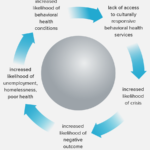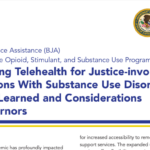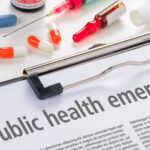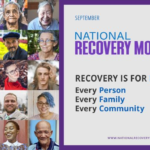Substance Use Disorder And Addiction
Governors have long been at the forefront of efforts to prevent and treat opioid use disorder and substance use disorder, working with stakeholders to mount a comprehensive response to the opioid epidemic.
Since 2012, the National Governors Association Center for Best Practices has supported states in their efforts to help prevent and treat substance use disorder. Over the years, NGA Health and NGA Public Safety and Legal Counsel have jointly worked with states to identify and implement evidenced based best practices related to substance use disorder. NGA focus areas include but are not limited to:
- Sharing evidenced based prevention, treatment, and recovery strategies and programs;
- Using data and evaluation in policy development;
- Improving outcomes for targeted populations (justice-involved individuals, pregnant and parenting women, LGBTQIA+, people of color, and other historically underrepresented populations);
- Expanding access to medication for opioid use disorder (MOUD);
- Identifying trends in polysubstance use and identifying comprehensive responses to addiction;
- Addressing infectious diseases as a result of SUD/OUD;
- Strategies to improve the treatment of individuals with co-occurring disorders; and
- Increasing access to non-opioid management of chronic pain.
Meet Our Team
- Marianne Gibson, Program Director, Substance Use and Mental Health
- Lauren Dedon, Senior Legal Policy Advisor
- Maria Kearl, Policy Analyst, Public Safety and Legal Counsels
Projects
No posts found.
Publications

Youth Mental Health and Substance Use
In a time when the drug supply is more lethal than ever, preventing substance use and mitigating risk among youth is a critical bipartisan priority. (Download) Mental health conditions and ...

Supporting and Sustaining Access to Harm Reduction Services for People Who Use Drugs
Harm reduction approaches are focused on minimizing the health, social and economic effects of drug use, including infectious disease spread and overdose with humility and compassion toward people who use ...

Behavioral Health Equity for All Communities: Policy Solutions to Advance Equity Across the Crisis Continuum
As a point of interception, equitable crisis response provides an opportunity to disrupt a cycle that has perpetuated longstanding challenges in underserved communities. (Download) Introduction The COVID-19 pandemic called widespread ...

Expanding Access to Medications for Opioid Use Disorder Treatment for Justice-Involved Populations Under Community Supervision: Best Practices from Four States
States discovered a variety of policy and programmatic approaches to improve the MOUD landscape. States were able to pilot interagency collaborations, launch training and education curricula and explore innovative solutions ...

State Efforts to Improve the Continuum of Care for Substance Use Disorder and Opioid Use Disorder
Lessons Learned from the National Governors Association Substance Use Disorder Learning Collaborative in Six States (Download) Executive Summary In June 2020, the National Governors Association (NGA) launched the Strengthening Substance ...

Lessons Learned in State Collaboration to Address Substance Use Disorder and Justice-Involved Individuals
This policy brief highlights lessons learned from collaborative efforts in Hawai‘i, Pennsylvania and West Virginia between SAAs and SSAs to address SUD issues within justice-involved populations. (Download) Executive Summary A ...
Substance Use Disorder And Addiction Library

Leveraging Telehealth for Justice-involved Populations With Substance Use Disorders
This brief reviews activities undertaken by states to expand the use of telehealth for justice-involved individuals with SUDs during the COVID-19 pandemic, share lessons learned, and highlight considerations for Governors ...

State and Federal Actions to Respond to Xylazine
Xylazine, also known as “tranq,” is a non-opioid drug commonly used for veterinary purposes which has been showing up more frequently in the illicit drug supply. To address the significant ...

Youth Mental Health and Substance Use
In a time when the drug supply is more lethal than ever, preventing substance use and mitigating risk among youth is a critical bipartisan priority. (Download) Mental health conditions and ...

DPAD Learning Collaborative
In January 2023, participants from Illinois, Nevada, North Carolina and Pennsylvania attended the kickoff meeting for the National Governors Association’s (NGA) Learning Collaborative on Strategies to Support the Development of ...

Wrap Up Meeting for the Policy Academy on State Strategies to Improve Care for Stimulant and Polysubstance Use
On September 19-20, 2022, the National Governors Association hosted the Wrap Up Meeting for the Policy Academy on State Strategies to Improve Care for Stimulant and Polysubstance Use in Los ...

National Recovery Month – 2022
National Recovery Month, which started in 1989, is a national observance held every September to promote and support new evidence-based treatment and recovery practices, the nation’s strong and proud recovery ...

Supporting and Sustaining Access to Harm Reduction Services for People Who Use Drugs
Harm reduction approaches are focused on minimizing the health, social and economic effects of drug use, including infectious disease spread and overdose with humility and compassion toward people who use ...

Behavioral Health Equity for All Communities: Policy Solutions to Advance Equity Across the Crisis Continuum
As a point of interception, equitable crisis response provides an opportunity to disrupt a cycle that has perpetuated longstanding challenges in underserved communities. (Download) Introduction The COVID-19 pandemic called widespread ...

Expanding Access to Medications for Opioid Use Disorder Treatment for Justice-Involved Populations Under Community Supervision: Best Practices from Four States
States discovered a variety of policy and programmatic approaches to improve the MOUD landscape. States were able to pilot interagency collaborations, launch training and education curricula and explore innovative solutions ...
Resources
- Vital Signs on overdose disparities by race, ethnicity, and other important social determinants.
- DOSE Dashboard includes monthly and annual nonfatal overdose data from syndromic surveillance systems in 42 states, including the District of Columbia. This represents the most up to date data that CDC’s DOSE system has available and is updated shortly after new data are made available each month. The dashboard provides data visualization that responsively adjusts to your selection of drug, state, month/year, age, and sex.
- SUDORS Dashboard includes comprehensive drug overdose data from 2020, from funded jurisdictions that met inclusion criteria. Participating jurisdictions provided data from death certificates and medical examiner/coroner reports (including scene findings, autopsy reports, and full postmortem toxicology findings). The dashboard provides a downloadable dataset that includes annual counts, percentages, and rates of drug overdose deaths per 100,000 persons.
- Overdose Funding Snapshots are a useful repository for federal and state funding data. These pages contain a history of CDC’s overdose funding, major milestones, and an interactive map with clickable states featuring individual state investments and key examples of work therein.
- Patient- and County-level Trends in Nonfatal Opioid-involved Overdose Emergency Medical Services Encounters, 491 Counties in 21 States, January 2018–March 2022: This report leverages very timely data on non-fatal opioid-involved EMS encounters using the Biospatial data. In 491 counties across 21 states, the rate of EMS encounters for nonfatal opioid-involved overdoses increased, on average, 4% quarterly during January 2018–March 2022. EMS encounter data involving suspected nonfatal opioid-involved overdose complements ED data and allows for near real-time analysis, which can inform public health response and prevention efforts.
- CDC Feature: International Overdose Awareness Day: A Time to Remember and Take Action, CDC’s IOAD feature, presents vital overdose statistics, offers tips on recognizing signs of overdose, and provides informational resources.
- A qualitative assessment of circumstances surrounding drug overdose deaths during the early stages of the COVID-19 pandemic, SUDORS Data Brief: The latest SUDORS data brief presents a qualitative assessment of circumstances surrounding drug overdose deaths during early stages of the COVID-19 pandemic, most notably physical and mental impacts of the pandemic and missed touchpoints or opportunities for intervention. It is critical to expand SUD screening, link persons into care and treatment, retain persons in SUD treatment, and expand telehealth during emergencies to identify and provide services to persons at increased risk of overdose.

